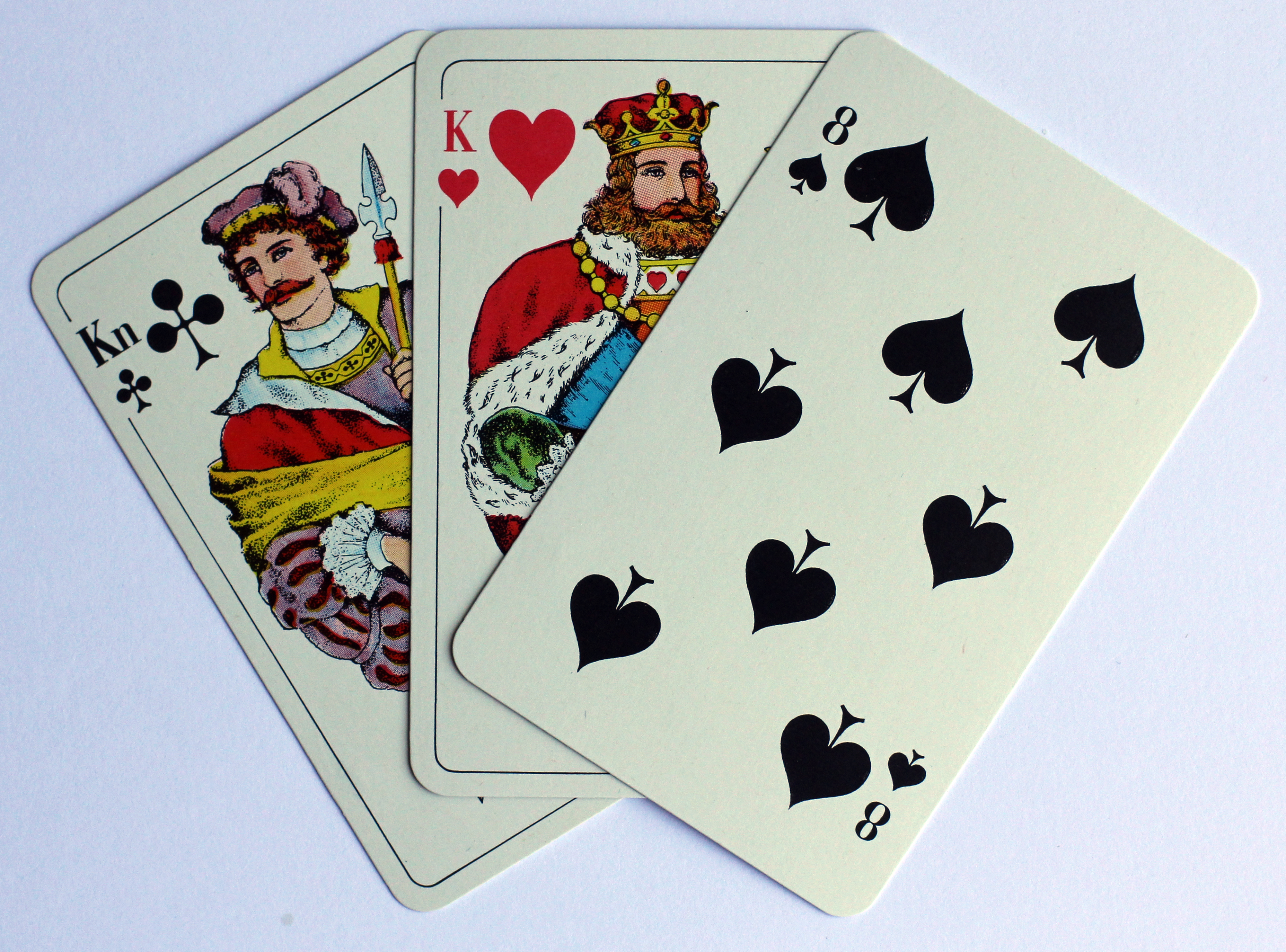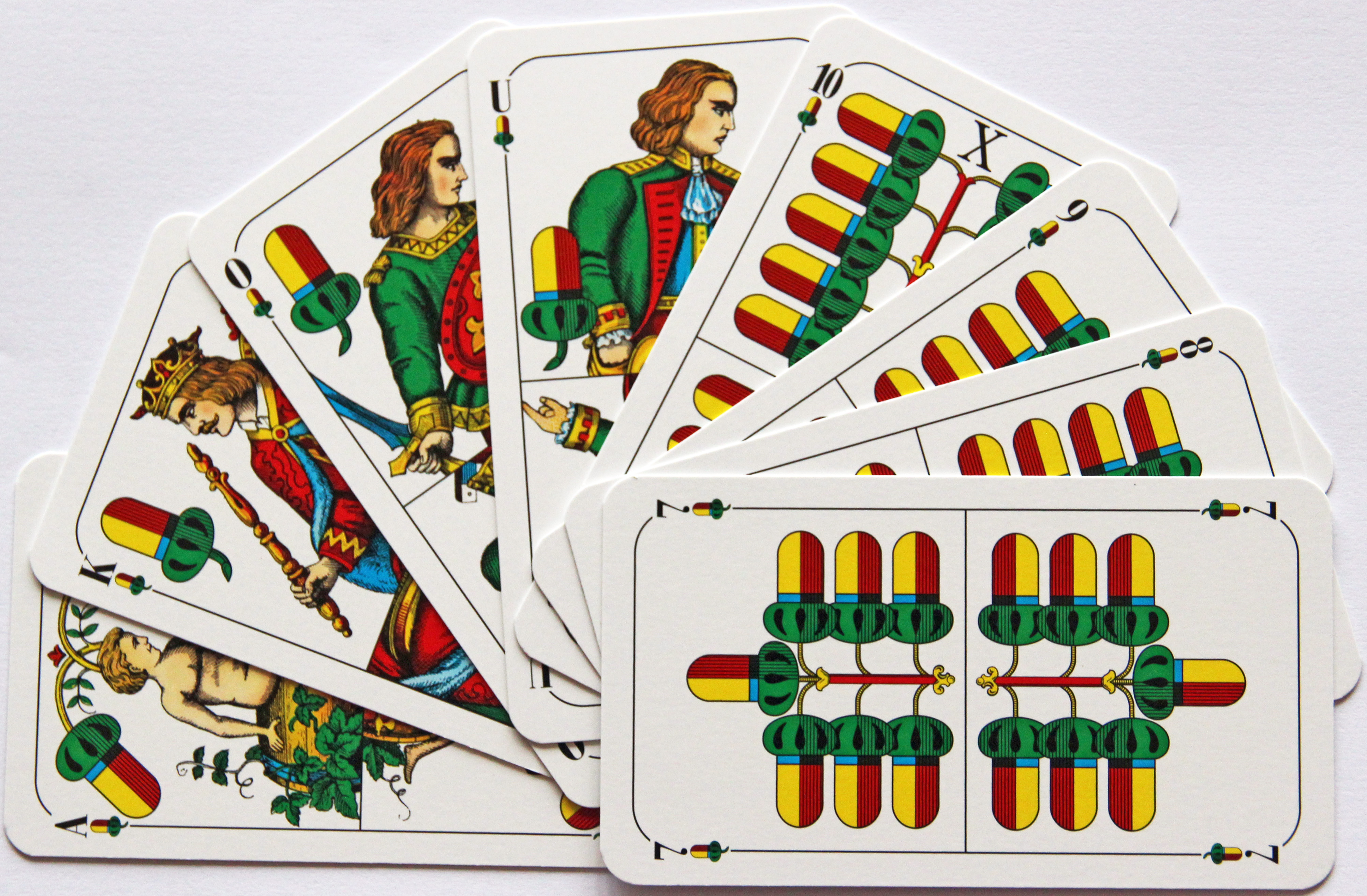|
Vorms
Voormsi or Vorms is an old, Greenlandic, trick-taking card game of the Brusbart family designed for four players. History Voormsi is "reputed to be ancient", possibly dating to the Whaling Period before 1721, between the late 15th century disappearance of the Norse settlement and the arrival of Danish missionaries. During this time, the only contacts with Europeans were with pirates and whalers. Its rules and terminology strongly suggest that it is descended from the centuries-old German game of Brusbart, now known as Bruus, which was once the national game of Hamburg and which spread across most of northern Europe spawning a family of similar games such as Russian Bruzbart, Polish Drużbart, Swedish Bräus, Icelandic Brús and others. Brusbart in turn descends from Karnöffel, the oldest card game in Europe with a continuous tradition of play down to the present day, a fact testified to by "the wildly disturbed ranking order in the chosen suit and particularly by the special ... [...More Info...] [...Related Items...] OR: [Wikipedia] [Google] [Baidu] |
Brus (card Game)
Brus is a four-hand card game of German descent that was once played in Denmark and Estonia. The game is descended from the oldest known card game in Europe, Karnöffel, a fact testified by its unusual card ranking and lack of a uniform trump suit. Brus is designed for four players and is played with 36 cards of a French pack, each of the four suits comprising the cards 6-10, Jack, Queen, King and Ace. History Brus is described as an old Jutlandish game, but its rules and terminology suggest that it is descended from the centuries-old German game of Brusbart, now known as Bruus, which was once the national game of Hamburg and which spread across most of northern Europe spawning a family of games such as Russian Bruzbart, Polish Drużbart, Swedish Bräus, Greenlandic Voormsi and others. Brusbart in turn is descended from Karnöffel, the oldest card game in Europe with a continuous tradition of play down to the present day, a fact testified to by "the wildly disturbed ranking ord ... [...More Info...] [...Related Items...] OR: [Wikipedia] [Google] [Baidu] |
Bräus
Bräus (or Brus) is an old Swedish card game from the island of Gotland that differs from all others in that not all cards are actually playable.Smith (1993), pp. 36/37 The game is descended from the oldest known card game in Europe, Karnöffel, a fact testified by its unusual card ranking and lack of a uniform trump suit.''Bräus regler'' at kortspelonline.se. Retrieved 21 May 2019. Bräus is designed for four players and is played with 36 cards of a , each of the four suits comprising the cards 6-10, Jack, Queen, King, and Ace. However, only 22 of these cards may be played. Background ...[...More Info...] [...Related Items...] OR: [Wikipedia] [Google] [Baidu] |
Brús
Brús is a traditional Icelandic card game for four-players using French-suited cards. It is descended via German Brusbart from Karnöffel, Europe's oldest known card game. History Brús is described as an old Icelandic game, but its rules and terminology suggest that it is descended from the centuries-old German game of Brusbart, now known as Bruus, which was once the national game of Hamburg and which spread across most of northern Europe spawning a family of games such as Russian Bruzbart, Polish Drużbart, Swedish Bräus, Greenlandic Voormsi and others. Brusbart in turn is descended from Karnöffel, the oldest card game in Europe with a continuous tradition of play down to the present day, a fact testified to by "the wildly disturbed ranking order in the chosen suit and particularly by the special role of the chosen Seven". It is believed that Brús was imported to Iceland from Denmark in the 19th century. The folklore historian, Ólafur Davíðsson, wrote about Icelandic ... [...More Info...] [...Related Items...] OR: [Wikipedia] [Google] [Baidu] |
Drużbart
Drużbart or Druzbart is an extinct Polish card game of the Bruus family.Smith (1997), pp. 45-51. The game is descended from the oldest known card game in Europe, Karnöffel, a fact testified by its unusual card ranking and lack of a uniform trump suit.McLeod (1996), pp. 54–55. Drużbart is designed for four players and is played with 36 cards of a German pack, each of the four suits comprising the cards 7–10, Unter, Ober, King, and Ace. Background Drużbart is one of a family of games descended from Karnöffel, the oldest European card game with a continuous tradition of play to the present day. These games are characterised by "the wildly disturbed ranking order in the chosen suit and particularly by the special role of the chosen Seven." It is one of the Brusbart family of games whose progenitor was the German game of Brusbart. Other members of the family include Russian Bruzbart or Dulya, Livonian Brusbart, Swedish Bräus, Danish and Estonian Brus, and Greenlandic Vo ... [...More Info...] [...Related Items...] OR: [Wikipedia] [Google] [Baidu] |
Chosen Suit
The following is a glossary of terms used in card games. Besides the terms listed here, there are thousands of common and uncommon slang terms. Terms in this glossary should not be game-specific (e.g. specific to Bridge, Hearts, Poker or Rummy), but apply to a wide range of card games. For glossaries that relate primarily to one game or family of similar games, see Game-specific glossaries. A ; Ace # The card with one pip in a pack of cards. Usually the highest card of a suit, ranking immediately above the King. May also occupy the lowest rank. # Commonly refers to the Deuce or Two in German-suited packs which don't have real Aces. Often the highest card of a suit. ; Acorns : One of the four suits in a German-suited pack of cards. Symbol: ; active # A card that is in play i.e. not sleeping. # See active player. ; active player # A player who receives cards in the current deal (i.e. is not sitting out because there are more players than the game is designed f ... [...More Info...] [...Related Items...] OR: [Wikipedia] [Google] [Baidu] |
Danish Card Games
Danish may refer to: * Something of, from, or related to the country of Denmark People * A national or citizen of Denmark, also called a "Dane," see Demographics of Denmark * Culture of Denmark * Danish people or Danes, people with a Danish ancestral or ethnic identity * A member of the Danes, a Germanic tribe * Danish (name), a male given name and surname Language * Danish language, a North Germanic language used mostly in Denmark and Northern Germany * Danish tongue or Old Norse, the parent language of all North Germanic languages Food * Danish cuisine * Danish pastry, often simply called a "Danish" See also * Dane (other) * * Gdańsk * List of Danes * Languages of Denmark The Kingdom of Denmark has only one official language, Danish, the national language of the Danish people, but there are several minority languages spoken, namely Faroese, German, and Greenlandic. A large majority (about 86%) of Danes also s ... {{disambiguation Language and nation ... [...More Info...] [...Related Items...] OR: [Wikipedia] [Google] [Baidu] |
Brus
Brus ( sr-cyr, Брус, ) is a town and municipality located in the Rasina District of southern Serbia. According to the 2011 census, the population of the town is 4,572, while the population of the municipality is 16,293. It is located at above sea level, just below the Kopaonik ski resort. The city is surrounded by hills on three levels, where the lowest one is a place where the Grasevka river firths into the Rasina river. On the upper level of the town, a fountain of medicinal mineral water is located. History From 1929 to 1941, Brus was part of the Morava Banovina of the Kingdom of Yugoslavia. Settlements Aside from the town of Brus, the municipality consists of the following villages: Demographics According to the 2011 census results, the municipality of Brus has a population of 16,317 inhabitants. Economy The following table gives a preview of total number of registered people employed in legal entities per their core activity (as of 2018): Twin cities * Berovo, No ... [...More Info...] [...Related Items...] OR: [Wikipedia] [Google] [Baidu] |
Matador (cards)
The following is a glossary of terms used in card games. Besides the terms listed here, there are thousands of common and uncommon slang terms. Terms in this glossary should not be game-specific (e.g. specific to Bridge, Hearts, Poker or Rummy), but apply to a wide range of card games. For glossaries that relate primarily to one game or family of similar games, see Game-specific glossaries. A ; Ace # The card with one pip in a pack of cards. Usually the highest card of a suit, ranking immediately above the King. May also occupy the lowest rank. # Commonly refers to the Deuce or Two in German-suited packs which don't have real Aces. Often the highest card of a suit. ; Acorns : One of the four suits in a German-suited pack of cards. Symbol: ; active # A card that is in play i.e. not sleeping. # See active player. ; active player # A player who receives cards in the current deal (i.e. is not sitting out because there are more players than the game is designed for a ... [...More Info...] [...Related Items...] OR: [Wikipedia] [Google] [Baidu] |
French-suited
French-suited playing cards or French-suited cards are cards that use the French suits of (clovers or clubs ), (tiles or diamonds ), (hearts ), and (pikes or spades ). Each suit contains three or four face/court cards. In a standard 52-card pack these are the ( knave or jack), the ( lady or queen), and the (king). In addition, in Tarot packs, there is a (cavalier) ranking between the queen and the knave. Aside from these aspects, decks can include a wide variety of regional and national patterns, which often have different deck sizes. In comparison to Spanish, Italian, German, and Swiss playing cards, French cards are the most widespread due to the geopolitical, commercial, and cultural influence of France, the United Kingdom, and the United States in the 19th and 20th centuries. Other reasons for their popularity were the simplicity of the suit insignia, which simplifies mass production, and the popularity of whist and contract bridge. The English ... [...More Info...] [...Related Items...] OR: [Wikipedia] [Google] [Baidu] |




.jpg)